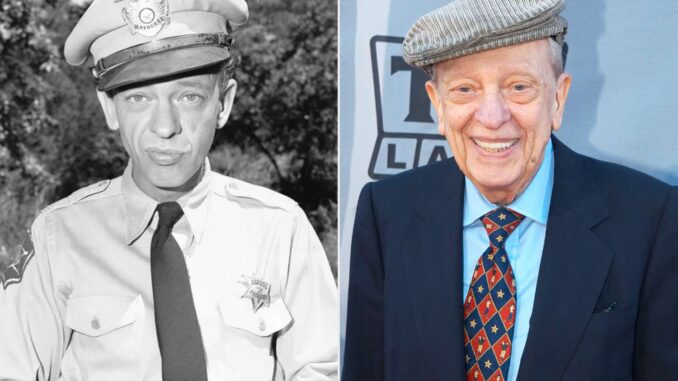
The golden, sun-dappled lanes of Mayberry, a mythical haven of quiet decency and gentle humor, shimmered with a comforting, almost palpable warmth. At its heart stood Andy Taylor, the embodiment of wisdom and calm. But it was his deputy, Barney Fife, who provided the frantic, beating heart of the town’s comedy, a whirlwind of insecurity, misplaced bravado, and utterly endearing neurosis. Don Knotts, the master behind this manic magic, won five Emmy Awards for his portrayal, making Barney an indelible part of American television history. So, when he departed the show after its fifth season, leaving a gaping, hilarious void, the official story of a expiring contract felt, to many, insufficient. The real reason Don Knotts left The Andy Griffith Show was not merely a matter of paperwork; it was a symphony of ambition, artistic necessity, and the natural, bittersweet evolution of a brilliant career.
On the surface, the explanation was straightforward: Don Knotts had signed a five-year contract with The Andy Griffith Show, while Andy Griffith himself had signed for longer. As the fifth season drew to a close, Griffith was reportedly considering ending the series to pursue a film career. Faced with this uncertainty, and with his contract nearing its end, Knotts was offered a lucrative five-picture deal with Universal Studios. It was a clear path to the silver screen, a chance to transition from television's beloved sidekick to a leading man. When Griffith ultimately decided to continue the show, Knotts was already committed. It seemed a simple, if unfortunate, case of bad timing and conflicting schedules. Yet, beneath this logistical truth lay deeper currents, the unspoken desires that made that five-picture deal so irresistible.
The real reason was ambition, pure and simple, but laced with the specific anxieties of an actor who had found, perhaps too perfectly, his defining role. Knotts was not just a comedian; he was a craftsman, a physical comedian whose every nervous twitch and high-pitched plea was meticulously honed. Barney Fife was a comedic goldmine, but he was also a finely drawn character with a fairly defined comedic arc. How many times could Barney accidentally discharge his gun, or scheme his way into another ridiculous predicament, before the well of Mayberry's gentle chaos began to run dry for the actor who played him? Knotts, by all accounts, was a professional who understood the value of creative challenge. He had proven his unparalleled genius as Barney. Now, he yearned to prove himself beyond that tightly buttoned, starched uniform.
Mayberry, for all its warmth and charm, was also a kind of gilded cage for an actor of Knotts's specific gifts. It was a world of specific boundaries, where the very consistency that made it beloved also limited the expansion of a character. Barney, as the foil to Andy's calm, was designed to react, to flounder, to provide the comedic tension within the established order. Knotts was acutely aware of the risk of typecasting, of being forever Barney Fife. The Universal deal offered not just money, but the tantalizing prospect of new characters, different genres, and the chance to stretch his comedic and dramatic muscles in ways Mayberry could not accommodate. It was a leap of faith, a test of his own versatility, a declaration that he was more than just one unforgettable character. He was an artist with wings that longed for wider skies.
Moreover, there's the subtly acknowledged reality of television success: a supporting player, no matter how iconic, rarely commands the same financial or creative leverage as the show's star. Don Knotts, despite his Emmy-winning brilliance, was still technically a co-star. The film world offered the potential for greater independence, a larger piece of the pie, and the coveted "above the title" billing. It wasn't about dissatisfaction with The Andy Griffith Show itself, which he loved and returned to for guest appearances. It was about the natural, often bittersweet, progression of a career that had outgrown its original, beloved home. He wasn't leaving out of anger or resentment, but out of a professional yearning, like a student graduating from a cherished school, ready to apply what they've learned in the wider world.
So, the "real reason" Don Knotts left The Andy Griffith Show was a tapestry woven from several threads: the pragmatic reality of a expiring contract coinciding with a new, exciting opportunity; the artistic imperative to explore new roles and avoid typecasting; and the powerful pull of ambition that drives any performer to seek new heights and challenges. He didn't abandon Mayberry; he bravely, and somewhat reluctantly, ventured beyond its borders, taking with him the invaluable lessons and the indelible spirit of Barney Fife. And while Mayberry certainly missed its high-strung deputy, Knotts's departure allowed both the show and the actor to evolve, forever cementing their respective, legendary places in the annals of American entertainment.